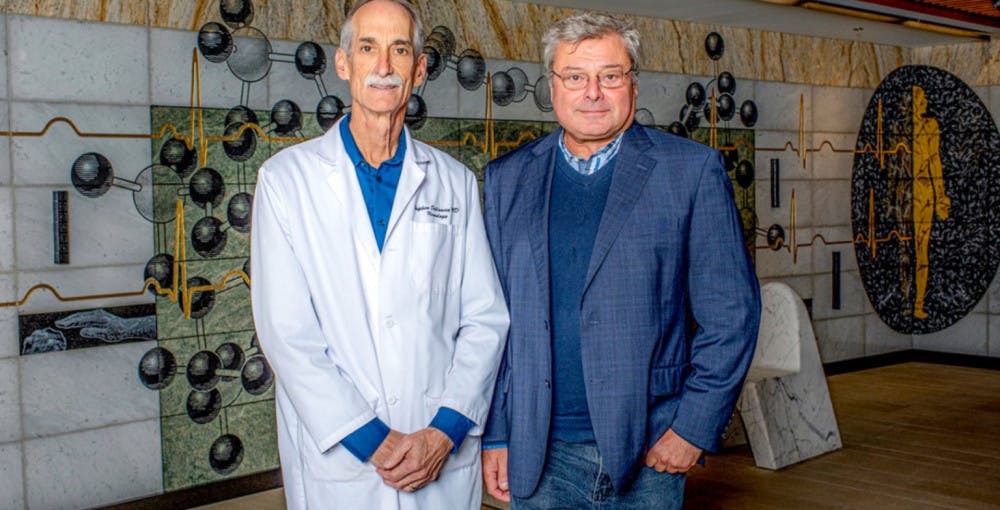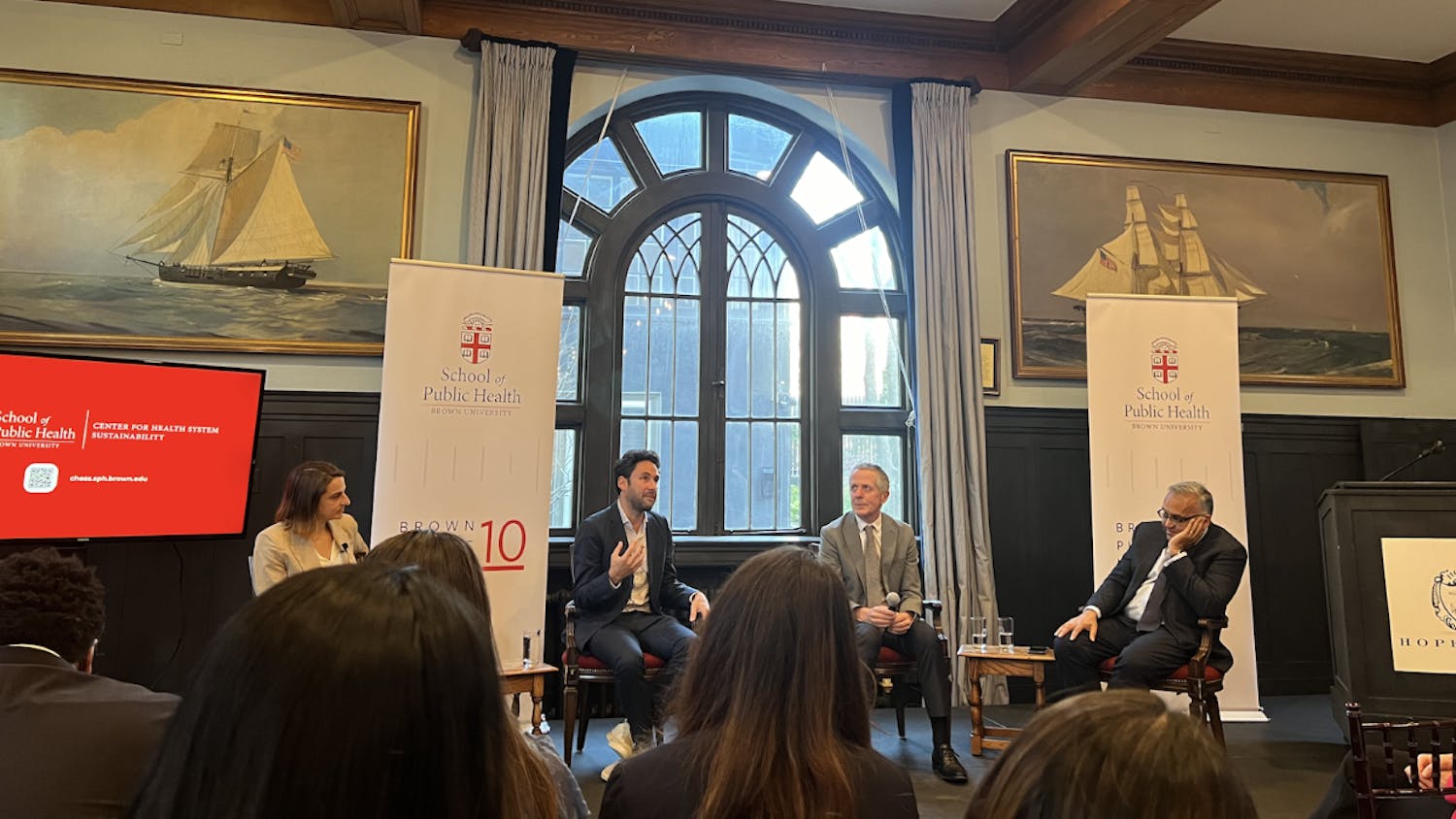[gallery ids="2839468,2839469,2839470"]
As part of its 2020 Research Achievement Awards, the University recognized the exemplary research of three accomplished professors in biology, computer science and alcohol and addiction studies with the Distinguished Research Achievement Awards.
These recipients add to the four Early Career Research Achievement awardees, The Herald previously reported. This installment of a two-part series features the work of University professors who have been recognized for their contributions not only at the University level, but also in the nation and across the globe, according to the University website.
Michael Littman codes for humanity
Inventor Danny Hillis once said, “I just want to make a machine that will be proud of me.” Referencing this quote, Professor of Computer Science Michael Littman PhD’96 related his work in machine learning and artificial intelligence to a similar goal. He focuses on reinforcement learning, a technique used to teach machines through positive and negative feedback.
Computer science has always appealed to Littman, who began working in the field when he was 13. “I like the idea that you can take very abstract things that float around your head and turn them into something real,” he said. The contributions he has made to computer science have ranged from developing theorems that show facts about computations, to empirical work, such as building systems that run these computations. He builds on these two common aspects of computer science research through his studies with human participants and human-computer interaction.
Through his research in machine learning, Littman aims to find innovative ways of teaching machines to carry out intended tasks. “One set of projects is about trying to reimagine machine learning from the perspective of people teaching machines, as opposed to machines learning from data,” Littman said.
In conjunction with these projects, Littman co-directs the Humanity Centered Robotics Initiative, whose goal is to make robots directly beneficial to people. “The emphasis from the very beginning was not to think of robots as a technological entity, but as the interaction between people and the machines,” Littman said. “Understanding people is a really important part of it.”
Through his work with artificial intelligence, Littman experiences the process of making another entity, putting it out in the world, teaching it things and seeing the world through its eyes. Despite the highly technical and artificial nature of his work, Littman is motivated by understanding the natural world better. “It’s fun to do that especially because these systems are themselves simpler than people, so if we can get a sense of the inner lives of these machines, maybe we can understand people better as well,” Littman said.
Peter Monti continues research on alcohol, HIV
Distinguished Professor of Alcohol and Addiction Studies Peter Monti has been researching substance use for over 30 years. For around the last 15 years, his research has focused on the biological and social aspects of the relationship between alcohol and HIV. “I fell in love with that area because I was always intrigued with the interaction between psychology and biology,” Monti said.
Monti runs Brown’s Center for Alcohol and Addiction Studies, which focuses on the psychosocial aspects of substance use and increasingly on its neurobiological underpinnings. A grant from the Centers of Biomedical Research Excellence that Monti received in 2019, which connected his “interest in addiction with the long-term sequel of disease,” enabled him to investigate questions like how alcohol affects dementia, or how alcohol and other substances affect HIV.
The grant provided Monti with infrastructure for his lab and studies, as well as facilitated the development of junior investigators. As the leader of the Center for Addiction and Disease Risk Exacerbation grant, Monti funds and mentors junior faculty members interested in addiction and disease risk studies until they are prepared to apply for their own grants. The CADRE grant has funded studies that involve human subjects and simulations, as well as studies that tap into the biology of substance use and HIV.
“We do a lot of neuroimaging in those studies and we’ve begun to see some links in level of alcohol use and brain function,” added Monti.
Monti’s studies have also demonstrated the effectiveness of motivational interviewing, an intervention technique that he and colleagues have developed over the past two decades. “A lot of it is giving people feedback in regards to their substance use. What we have found is that we can work with individuals to get them to drink less,” Monti said, adding that this impacts both substance- and HIV-related and general health.
The COVID-19 pandemic has limited participants’ ability to come to his lab for his research, but therapy interventions for other studies are still delivered by video conference.
Monti looks forward to continuing his work on the CADRE grant and in expanding his work in alcohol and HIV to clinics across the country.
John Sedivy advances aging research
John Sedivy, professor of biology and director of the Brown Center on the Biology of Aging, has been working on understanding the basic mechanisms of aging and cell death, in particular a form known as cellular senescence, since he came to the University in 1995.
“I started working in cancer research. What got me going into aging was the discovery of telomeres,” the ends of genetic material, which promote aging and cellular senescence, said Sedivy. “I got very interested in understanding the mechanisms of how that actually works.”
Cellular senescence affects all tissues and is a phenomenon that becomes pronounced with aging and promotes age-associated diseases. Through research with long-lived mice and studies with cell cultures, Sedivy is able to study the intersection of cellular senescence and retrotransposable elements, which are responsible for creating virus-like entities in all of our genomes. “The most exciting thing that we discovered recently is that some drugs that have been used to treat HIV are also effective against these retrotransposable elements,” Sedivy said. He added that these drugs have been effective in treating age-associated diseases in mice.
Sedivy has also received a grant for a clinical trial to test these drugs’ efficacy in treating neurodegenerative disorders, specifically, Alzheimer's, The Herald previously reported.
This study “could have a profound impact in the clinic. I think it is something that is very exciting and we have indications that this may apply to many different diseases. Those are the kind of results that are almost too good to be true,” Sedivy said.
Although the recognition ceremony for all seven awardees was postponed due to COVID-19, “we will find a way to celebrate the award in the future,” Vice President of Research Jill Pipher wrote in an email to The Herald.

ADVERTISEMENT




